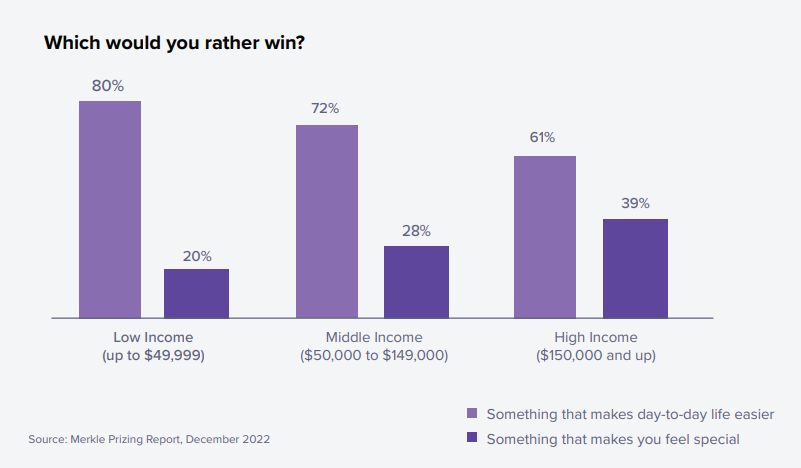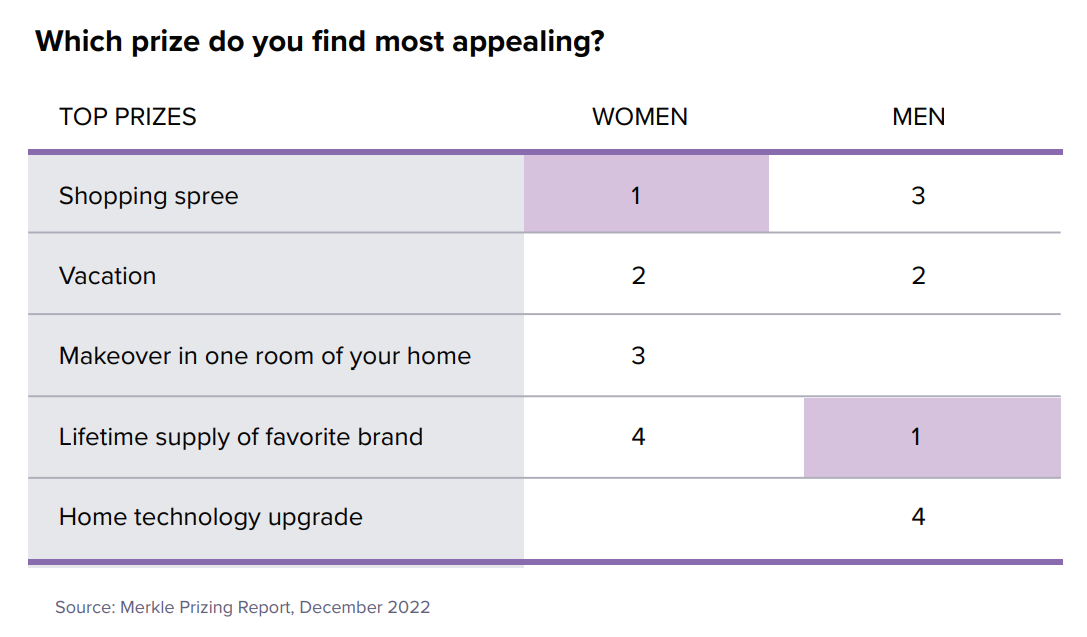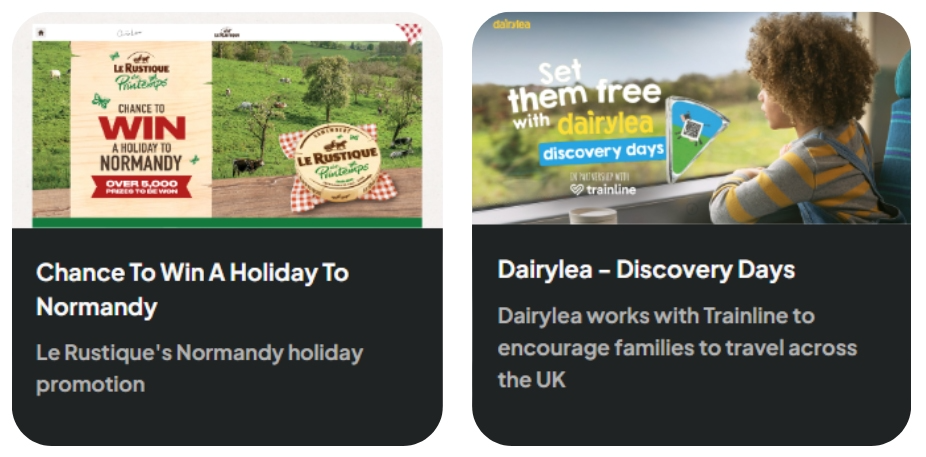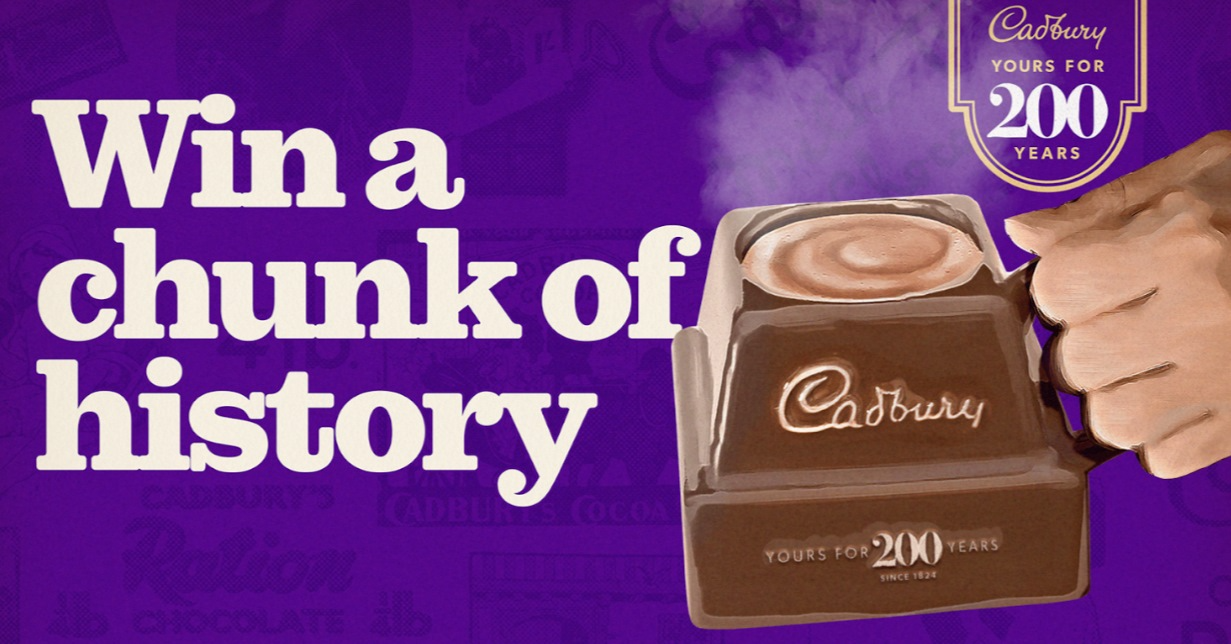Looking at data and different prize types to understand what makes a promotion’s prize pool appealing to consumers.

The main hook of any prize promotion is the titular prize that will encourage shoppers to engage and interact with your brand’s promotion.
The prize pool of the promotion should relate to and reflect the brand while still being something that shoppers and consumers will want enough to participate in.
Participant behaviours and attitudes towards prizes
Relating the promotional prizes to brand and audience
Prizing case study: Dairylea & Le Rustique
Relating the promotional prizes to the season
Relating the promotional prizes to events and occasions
Cash
Vouchers, and gift cards
Merchandise
Vacations and holidays
Homeware & Appliances
Technology
Ticketed events
Other prize ideas
In a 2025 survey done by comping commentator Di Coke, she proposed the question, “Do they enter for prizes they don’t want for themselves?” The survey found from a participant group of 1,221 that 72% entered for prizes they didn’t want to win for themselves, while 28% only entered to win for themselves. Of the 72%, 92% said they wished to win prizes as gifts for family and friends.
We see this reflected in current promotions. For example, Cadbury’s ‘Giveaway Give-Away’ promotion leverages the brand’s “share” strategy. In this prize promotion, winners don’t keep the cash; instead, they nominate others to receive the prize – the entire promotion is based on giving winnings away.
In a report conducted by Merkle, surveying 1,151 participants, titled Rewards That Resonate in a Post-Pandemic World, results revealed that in terms of consumer preferences, not much has changed since the 2016 and 2018 prizing reports conducted by HelloWorld (now acquired by Merkle). The key takeaways were as follows:


Brands can relate the promotion back to the brand’s demographic or to a seasonally relevant occasion or event. This could be, for example, holidays like Easter or Christmas – or sporting events like the Olympics or the Euros.
The prize your brand offers should show some relevancy to your brand or represent your audience in some manner.
When these prizes are desirable to a brand’s demographic, it’s a physical demonstration of its understanding of their audience. Customers that feel seen and catered to continually engage and interact due to the level of relevancy that the brands have to them. It improves the overall promotion memorability, encouraging participation and audience interest.
As an example, let's compare two different types of cheese brands and the prizes they’ve previously offered in sales promotions.
Dairylea’s general target audience and demographic mainly consist of families with children. Their brand conveys a sense of fun-playfulness – it’s a nostalgic lunchbox classic that focuses on enjoyment for everyone in the family.
On the other hand, Le Rustique is a French cheese brand that has a demographic of “foodies”, seeking authenticity and willing to pay a premium for speciality cheeses. The brand focuses on authenticity and quality, deepening its place in both casual and elevated dining experiences “that transports you to the enchanting countryside of France”.

Both these brands have previously run prize promotions, and their prize pools have directly reflected their branding. In their spring promotion, Le Rustique has previously offered prizes like holidays to Normandy – where their brand began; branded picnic hamper sets and Laguiole cheese knives. These prizes focus on the cheese and gourmet experience itself that audiences seek from a brand like Le Rustique. The prizes are therefore relevant to their branding and more desirable to their audience and target demographics.
In Dairylea’s promotion, they connect directly with their audience – their main customer base of families – and link this promotion strongly to their presence as a quintessential UK food brand. This is not only done in the messaging and copy but also in their partnership with Channel 4 and Trainline and in the prize that was offered. The prize is offered widely to participants, offering money-off vouchers for Trainline journeys, encouraging families to explore locations across the UK. The prize places an emphasis on family trips and the playful exploration and adventure in their branding.
Prizes can be seasonal and based on time-sensitive periods. For example, August is a great month to run a back-to-school promotion, especially if the brand itself usually sees higher foot traffic during that time. For example, in back-to-school promotions, stationery brands may see higher sales as parents need to buy supplies for the school year, or during the lead-up to Halloween, confectionery brands have a great opportunity to run on-pack promotions.
Brands don't necessarily have to fit inside the category of brands that benefit from seasonal promotions to reap the benefits of the period. Sometimes relevant promotional prizes can also be effective in enticing shoppers if properly signposted on promotional materials.
Events such as the Olympics, the Euros, other sporting events, music festivals, and annual events make for strong occasions to base a promotion around. They create an opportunity for brands to capture the attention of fans of these events, teams, artists, and celebrities.
You don't have to be an official sponsor to gain leverage from an event. There are many examples of ambush marketing: unofficial sponsors edging out official sponsors during mass events with well-thought-out campaigns.
Many notable events, groups, and individuals will have a devoted fanbase and often a ‘fandom’ who has formed a parasocial relationship and interest in them, making them particularly passionate. These types of fans are dedicated and often love to support their favourites. This type of fan is a way for brands to potentially connect with new customers and audience demographics through their vested interest in an event or person(s).
‘Cash is king’ is a popular consensus and well-known phrase in the promotional industry; cash prizes are always a solid choice that is a favourite of shoppers and consumers. Cash gives the most flexibility and freedom to the winners, making it a brilliant prize offering in any prize promotion.
Many brands still hesitate to offer cash prizes since they’re often used towards necessities and as a method of budget relief. Whilst there is no issue with cash prizes outside of secure payment methods, brands sometimes want to steer consumers to more specific experiences that build memorability that a cash prize may not present.
The use for cash is so broad that sometimes the initial excitement of winning is flattened as the cash (depending on the amount) is absorbed into the winner’s wider budget and spending.
Depending on the type of gift card or voucher, this prize type still offers plenty of flexibility whilst being more specific and targeted than a cash prize.
There are several vouchers and gift card types to consider, but what proves to be one of the more popular versions is multi-brand gift cards that offer a large range of brands or experiences to redeem against.
Using vouchers allows brands to better tailor the prize being offered to the promotion’s participants – allowing for better and more specific audience targeting – all the while still affording a level of flexibility and freedom to winners.
There are plenty of companies who offer a variety of experiences and brands as part of their e-vouchers, giving participants the choice from a variety of options. Some examples:
Offering merchandise is very common in prize promotions, often as ‘filler’ for ‘lower-tier’ prizes.
If brands wish to integrate merchandise in the prize pool in a meaningful and impactful way, they should take care when creating the merchandise, as often it can be generic, holding little to no appeal for participants. The merchandise should be tailored to fit the brand and products. In the hot drinks category, for example, a branded mug would make for a great piece of merchandise. A great real-life case of this is in Cadbury’s 200-year anniversary promotional campaign; Cadbury had an on-pack promotion on their hot chocolate products. The prizes for this on-pack promotion included a “limited edition vintage-style chunk mug”, which was not only well-designed but was still Cadbury-branded, making for a memorable piece of merchandise with lots of reusability.

While ‘merchandise’ can often be branded promotional goods, it can also refer to the actual products a company sells. A great way to engage audiences is offering free, sample-size versions of a brand’s goods. Chances are, if a participant bought a promotional pack to enter the promotion, they likely have some measure of interest in other similar products. Samples and minis can be a great way to introduce a new product to consumers and make for a great addition to prize promotions.
Many brands may also offer gift hampers which include their merchandise, bundling various products both from their brand and others’ for winners. Whilst merchandise is not a particularly powerful prize offering and is unlikely to be the headline prize(s), it’s a great way to offer more prizes to more participants outside of the main-prize winners, often without too much additional cost to the brand.
Holiday prizes are highly desirable and can gain a lot of traction from consumers as a headline prize. Getaways allow brands to give winners an experience that they perhaps would not otherwise have the budget, time, or thought to plan for themselves.
It ensures that when a participant wins, the prize actively rewards them, creating lifelong memories for the winner. As opposed to a cash prize where, as previously mentioned, the prize money may just be absorbed into the winner’s wider spending budget, making it forgettable despite being a very flexible and favoured prize.
The main issue with offering vacation prizes like this is the logistics. It will largely depend on when the winner will want to take the trip (which is why many promoters put restrictions on when a winner can go) and on planning the activities and transport included in the prize. For this reason, several promotions rely on prize management providers, such as Prize Professionals, to plan and organise prize fulfilments in promotions.
This is a relatively common prize offered by brands in prize promotions. They’re a great prize type to offer to a broad range of audiences due to the diversity of demographics of consumers who would want to win from that prize type.
For many consumers, promotions for more general appliances like a fridge may not be as appealing for more niche appliances such as air fryers or stand mixers, as most households already own major appliances like a fridge. Unless the said appliance is a major upgrade from what they already own, it’s unlikely that participants will enter the promotion to win the prize for themselves.
Another popular prize type given away in promotions is various forms of tech. Whilst the category itself is quite broad, brands may offer TVs, computers, consoles, smartphones and the like as headline prizes whilst offering speakers, smart watches, headphones/earphones, etc., as middle-to-lower-tier prizes.
Limited-time and exclusive events are a very specific prize type but create an opportunity for massive consumer intrigue if targeted accurately to audiences. Music and sports are two industries with the most dedicated and loyal audiences. Because the consumer type of a ‘fan’ is highly invested and engaged in their favourite artists and players, ticketed events like music festivals, matches, concerts or championships are highly sought after.
While it may not attract as large a breadth of participants due to its specificity, the level of engagement and interactivity fans are willing to put in is much higher because of the parasocial rapport naturally built up through ‘fandom’.
There are so many possibilities for brands in terms of prizes. The main consideration in choosing and ideating for a prize pool is how well the ‘prize’ aligns with the branding and ethos as well as the promotional campaign itself.
Some other prize categories seen include:
If you’re having trouble understanding the kind of prizes your audience is looking for, you can get in touch with a prize fulfilment & management specialist or a partner agency who can help your brand curate an attractive prize pool. You can get in contact with an expert at no cost. Speak with a promotional specialist at +44 (0) 203 80 555 36 or email hello@promotionsinteractive.com to learn more.
We’re happy to answer any of your questions or to tell you more about what we do and how we could support your next promotional campaign.